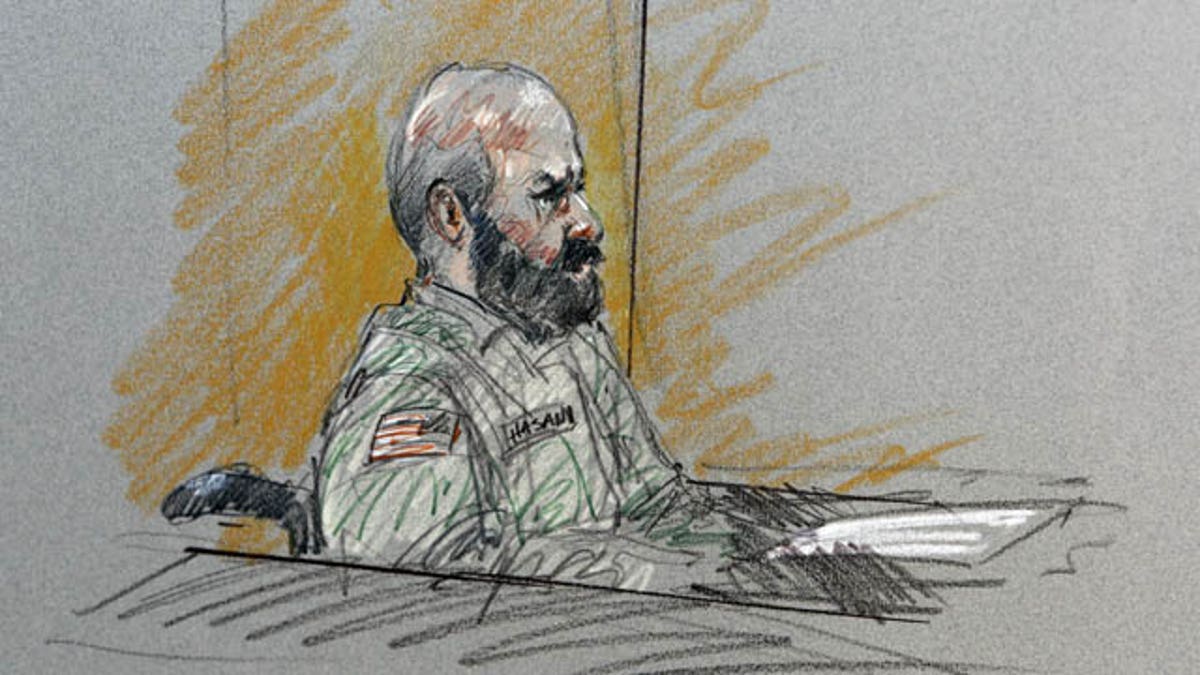
FILE- In this Aug. 6, 2013, file courtroom sketch, Maj. Nidal Malik Hasan sits in court for his court-martial in Fort Hood, Texas. (AP Photo)
FORT HOOD, Texas – The prosecutors pursuing the death penalty against the Army psychiatrist accused in the 2009 Fort Hood shooting rampage will soon begin trying to answer a difficult but key question: Why did Maj. Nidal Hasan attack his fellow soldiers in the worst mass shooting ever on a U.S. military base?
Both sides offered a few hints so far. Although he's been mostly silent in the courtroom, Hasan used his brief opening statement to tell jurors he had "switched sides" in what he called America's war with Islam and he later leaked documents to the media showing he believed he could be a martyr.
On Sunday, the Killeen Daily Herald published contents of a three-page letter it received last week from the American-born Muslim in which he said he was "defending my religious faith" when he carried out the attack.
"It is one thing for the United States to say `We don't want Shariah (God's) law to govern us' but its (sic) not acceptable to have a foreign policy that tries to replace Shariah law for a more secular form of government," he wrote, echoing similar comments he's made in the media.
Military prosecutors opened the trial by saying they would show that Hasan felt he had a "jihad duty," referring to a Muslim term for a religious war or struggle. After calling almost 80 witnesses over two weeks, prosecutors said Friday they would begin tackling the question this week.
How much they can say to jurors, however, may be limited by the judge. Even though plenty of information about Hasan's extremist views has been published outside the courtroom since the rampage, the 13 military officers on the jury said they had not closely followed the case and wouldn't read news coverage during the trial.
Prosecutors asked the military judge, Col. Tara Osborn, on Friday to approve evidence and several witnesses to explain Hasan's mindset. Such evidence includes references to Hasan Akbar, a Muslim soldier sentenced to death for attacking fellow soldiers in Kuwait during the 2003 Iraq invasion.
Prosecutor Col. Steve Henricks told Osborn that Hasan had shown interest in Akbar's case and prosecutors wanted to prove Hasan's attack was a "copycat." The skeptical judge told Henricks she didn't want to hold a "mini-trial" of Akbar and asked how he would introduce the case to jurors. Henricks said he planned to call a prosecutor to discuss its basics, but he didn't identify the prosecutor. Akbar was prosecuted by Col. Mike Mulligan, the lead prosecutor in Hasan's trial.
Henricks has alleged that besides his so-called "jihad duty," Hasan was looking for ways to get out of deploying, and he said witnesses could include former classmates who heard him talking about suicide bombers.
Prosecutors also said they wanted to introduce three emails, but they didn't disclose details. The FBI has said Hasan sent numerous emails starting in December 2008 to Anwar al-Awlaki, a radical U.S.-born Islamic cleric killed by a drone strike in Yemen in 2011.
Osborn promised to rule Monday on what prosecutors could present.
While prosecutors clearly have an advantage in how much evidence is on their side, the 13-officer jury must be unanimous in convicting Hasan of premeditated murder and for approving a death sentence.
Such sentences are rare in the military justice system: Only 16 death sentences have been handed down during courts-martial, or military trials, over the past three decades -- and 11 of those have been overturned, most on appeal due to errors in the trial. As a result, prosecutors have been careful to watch for any oversights or mistakes during the trial.
Even if Osborn keeps out most or all of the disputed evidence -- a possibility since any issue could come up on appeal -- prosecutors have done plenty to prove Hasan deserves the death penalty, said Richard Rosen, a military law expert who teaches at Texas Tech University. He described some of what prosecutors hope to present as further "nails in the coffin."
"This isn't a terrorism trial, and she may decide that this would just unnecessarily inflame the jury, and that it's not worth the risk," Rosen said. "But it clearly is relevant evidence."
Prosecutors said they had between 15 and 25 witnesses left, meaning Hasan could get his chance to defend himself as early as Tuesday or Wednesday. He signaled before trial that he had just two witnesses.
Hasan -- who is acting as his own attorney -- told jurors during a barely one-minute opening statement that evidence "will clearly show that I am the shooter," but he said it wouldn't tell the whole story.
Since then, his defense has been nearly non-existent. He mumbled through a series of rambling questions of his former supervisor, retired Lt. Col. Ben Phillips, talking about "medical personnel initiating mercy killings" and a water supply in Iraq being contaminated with gas. But he was cut off by prosecutors' objection, which was upheld by the judge.
Among those likely to pay especially close attention are victims pressing the federal government to formally acknowledge the Fort Hood shootings as an act of terror, not workplace violence, and provide more benefits.
"We're very interested to see whether and to what extent the government pursues Hasan's jihadism," said Reed Rubinstein, an attorney for the victims. "It would be welcome if the prosecutor would make very explicit the fact that this was a jihadist attack. This was terrorism."
Rubinstein is much less interested in what Hasan has to say.
"He's certainly said and done enough, thank you," he said.

